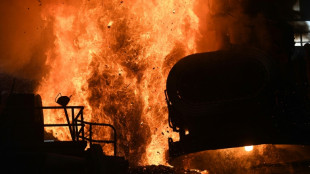
-
 Asian markets mixed as tariff uncertainty looms large
Asian markets mixed as tariff uncertainty looms large
-
South Korea's Yoon blames 'malicious' opposition for martial law bid

-
 Russia's 'shadow fleet' brings 'high risk' of oil spill
Russia's 'shadow fleet' brings 'high risk' of oil spill
-
Doncic off the mark as Lakers rout Jazz

-
 Trump signs executive orders for steel, aluminum tariffs to start March 12
Trump signs executive orders for steel, aluminum tariffs to start March 12
-
Trump floats Ukraine 'may be Russian someday' ahead of Zelensky-Vance meeting

-
 Pacific nation Vanuatu elects prime minister
Pacific nation Vanuatu elects prime minister
-
'My own Apocalypse Now': 'White Lotus' returns with steamy Thailand romp

-
 Malaysia's Hindus mark Thaipusam festival with fervour
Malaysia's Hindus mark Thaipusam festival with fervour
-
Philippine divorce activists vow to fight on

-
 Virus disinformation drives anti-China sentiment, lockdown fears
Virus disinformation drives anti-China sentiment, lockdown fears
-
World leaders seek elusive AI common ground at Paris summit

-
 Asian markets swing as tariff uncertainty looms large
Asian markets swing as tariff uncertainty looms large
-
Venezuela sends planes to fetch irregular migrants from US

-
 Google changes name of Gulf of Mexico to 'Gulf of America' for US users
Google changes name of Gulf of Mexico to 'Gulf of America' for US users
-
YouTube, the online video powerhouse, turns 20

-
 Playgrounds come alive again with Brazil school phone ban
Playgrounds come alive again with Brazil school phone ban
-
'So fast': NY subway shove survivor captures commuter fears

-
 Could a climate megaproject cloud Chile's unparalleled views of universe?
Could a climate megaproject cloud Chile's unparalleled views of universe?
-
Trump's tariff tactics may reshape global trade: analysts

-
 Trump warns 'all hell' will break loose if Gaza hostages not returned
Trump warns 'all hell' will break loose if Gaza hostages not returned
-
BioVersys Successfully Advances Bv500 NTM Program with Continued Support from CF AMR Syndicate

-
 Relief Therapeutics Announces European Patent Office Decision to Grant Patent for RLF-TD011
Relief Therapeutics Announces European Patent Office Decision to Grant Patent for RLF-TD011
-
Trump warns of 'all hell' if Gaza captives not freed by Saturday

-
 Trump signs executive orders on steel, aluminum tariffs
Trump signs executive orders on steel, aluminum tariffs
-
Elon Musk heads group trying to buy control of OpenAI: report

-
 Young, Irving replace Giannis, Davis in NBA All-Star line-ups
Young, Irving replace Giannis, Davis in NBA All-Star line-ups
-
US judges challenge Trump cuts as legal battles mount

-
 Celtic's Maeda cleared to face Bayern Munich
Celtic's Maeda cleared to face Bayern Munich
-
Global stock markets brush off latest Trump tariffs

-
 Union sues over US consumer protection agency work pause
Union sues over US consumer protection agency work pause
-
Inter a point behind leaders Napoli after squeezing past Fiorentina

-
 Palace sink Doncaster to book clash with rivals Millwall
Palace sink Doncaster to book clash with rivals Millwall
-
Ntamack banned for Italy game despite France efforts

-
 Duterte's future in balance as Philippine election season kicks off
Duterte's future in balance as Philippine election season kicks off
-
At least 55 dead after Guatemala bus plunges into ravine

-
 Ronaldo reaches deal with Saudi club Al Nassr to extend contract: source
Ronaldo reaches deal with Saudi club Al Nassr to extend contract: source
-
Man City still worst opponent for Real Madrid, says Ancelotti

-
 Trump team orders work pause at US consumer protection agency
Trump team orders work pause at US consumer protection agency
-
'Just not ready' - Tiger Woods pulls out of Torrey Pines tournament

-
 Zelensky to meet JD Vance in Munich on Friday: Kyiv presidency
Zelensky to meet JD Vance in Munich on Friday: Kyiv presidency
-
Church of England meets amid 'crisis' over abuse scandals

-
 Macron vows at summit France to 'deliver' on AI acceleration
Macron vows at summit France to 'deliver' on AI acceleration
-
NY jury hears attacker 'dangerously close' to killing Salman Rushdie

-
 Steel at heart of new Trump trade war
Steel at heart of new Trump trade war
-
Hamas says stops Gaza hostage release 'until further notice'

-
 Cycling: five rough diamonds who dream of being the new Pogacar
Cycling: five rough diamonds who dream of being the new Pogacar
-
'I don't have time': Mother of jailed UK-Egyptian makes Starmer plea

-
 Feyenoord coach Priske pays for 'lack of chemistry'
Feyenoord coach Priske pays for 'lack of chemistry'
-
White S. Africans clamour for US resettlement after Trump order


Could a climate megaproject cloud Chile's unparalleled views of universe?
As night falls on the Atacama desert in northern Chile four giant telescopes turn their gaze towards the star-strewn heavens.
The driest place on Earth is the best place to observe the universe, with darkness offering dazzling spectacles of cosmic wonder.
The area is home to the Paranal Observatory, which houses the European Southern Observatory's Very Large Telescope, used by astronomers to search the Milky Way with "unparalleled clarity," according to Spanish astrophysicist Itziar de Gregorio.
Perched at 2,635 meters (8,645 feet) above sea level, and located dozens of kilometers (miles) from the nearest town of Antofagasta, Paranal's unique atmospheric conditions make it one of the most productive observatories in the world.
The Very Large Telescope -- made up of four individual telescopes -- produced the first ever image of an exoplanet (a planet outside our solar system) in 2004.
But a huge green energy project, part of Chile's plans to become carbon neutral, risks clouding the view, scientists say.
Latin America's fifth-largest economy aims to phase out fossil fuels by 2050, replacing them with renewable energy sources, which can also be used to produce green hydrogen.
Green hydrogen, a clean method of generating electricity, has been touted as a means to help decarbonize Chile's crucial copper mining sector, among other industries.
AES Andes, the Chilean subsidiary of US energy company AES Corporation, has submitted proposals for a 3,000-hectare (7,400-acre) site in the Atacama desert near Paranal to harness solar and wind energy, which in turn can be used to produce green hydrogen and ammonia, a gas used in making fertilizers.
But scientists say the artificial light from such a facility could obscure some of the celestial phenomena observed at Paranal, such as eclipses and meteorite showers.
They worry it could also endanger the functioning of the ESO's Extremely Large Telescope, billed as the world's "biggest eye on the sky," currently under construction near the Paranal Observatory.
The stadium-sized telescope is slated to be completed by 2028.
De Gregorio, the ESO's representative in Chile, warns that the country's unique "window onto the universe" could close, hampering scientists' quest to answer the great question of our time: Are we the only intelligent life form in the universe?
- Like 'a tap running' -
Chile, home to around 70 percent of the world's telescopes, has long been seen as a hub for stargazers.
By day, astronomers at Paranal crunch numbers. By night, they explore the galaxy.
The observatory's research covers almost all celestial phenomena, from planets and exo-planets to black holes and near-Earth comets, Steffen Mieske, the head of the site's scientific operations, said.
That work could be jeopardized if the night sky brightens, even a fraction.
"Light pollution is the main threat to astronomy because it affects the quality of the observable sky," the Skies of Chile Foundation, which works to preserve the quality of the country's night skies, argues.
"When you see a tap running, you realize you're wasting water. But if you see a place lit up brightly at night, you don't think of it as pollution," the foundation's director Daniela Gonzalez said.
AES Andes, in a statement, assured that its hydrogen and ammonia project, codenamed Inna, conformed to the "highest norms in terms of lighting," including a new Chilean rule aimed at protecting astronomy sites from skyglow.
It has rejected Paranal's claim that it would be within 11 kilometers of the observatory, saying the distance would be around twice that.
A group of 40 astronomers, scientists and poets have called for the establishment of a "light exclusion zone" around Paranal, to keep it pitch-black at night.
The Inna project, which is currently awaiting an environmental permit, is not expected to be licensed for another two or three years.
A.Ruiz--AT
